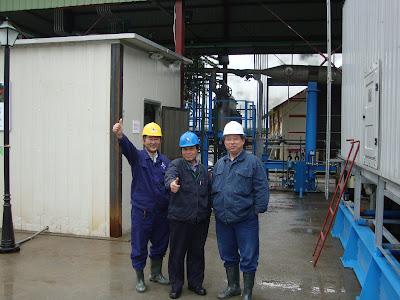
Life comes in packets, I think. It comes in sections of time with borders constituted by changes in life’s pace, mood, activity, place, philosophy, circumstance, etc. Years and semesters of school are discrete in these ways. Periods lived in one city or another, or working various jobs, or dating a person, or playing on a certain team are also ways to partition the otherwise continuous river of life.
Sometimes changes are gradual and barely discernable, and other times they are stark and rapid. No transition in my life, however, has ever been as drastic or profound as the transition from China to Spain.
I left my frigid, biohazardous, dark, and jackhammeringly noisy apartment in Shanghai at the end of a long and challenging winter in Shanghai. Each day was a new challenge and a new learning experience in my 100% Chinese office, in smoky factories, power plants, and meeting rooms, in my Chinese language classes, and on the bustling Chinese streets. I grew and learned through those challenges, but also frequently remarked how much more comfortable life might be without some of the less enjoyable accoutrements of life in China: the smog, toxic water, noise, unforgiving language barriers, and general marginalization of the individual in the sea of billions. I left the country knowing that I had ended a 4-month period of rapid and important learning and personal growth, but also looking forward to something a bit more comfortable and familiar.
Fast forward to Madrid, where I disembarked from my train into the balmy Mediterranean air. Pablo, a Spaniard I met through a friend several years ago in New York City, waited to help me with my bags. Pablo had graciously offered to host me for the next month and a half.
I knew little about what to expect. For example, I did not expect to live in a famous and beautiful piece of Spanish architecture – a house frequently shown in design magazines and architecture blogs for its genius use of material, space, and light. I did not expect to pass through three fortress-like security gates, meet multiple guards, and be "introduced" to gigantic German Shepherds so that they would not tear out my throat when returning from my morning runs. I did not expect to have a forest of manicured running and biking paths at my disposal, nor did I expect them to be stocked with tweeting songbirds. I was certainly surprised to see my new home featured as a set in a new G-Unit music video.

So, that was a nice change. Then there was the language, which I already know a bit about, and can navigate with some confidence. As in China, I have enrolled in an aggressive schedule of language courses to learn more. Languages, I’ve come to believe, are the most critical key to understanding and participating in a culture.
My work is also new and different. I am working with the second largest private company in Spain, Gestamp, which employs over 50,000 Spaniards. All my previous projects in China and Iceland focused on broad business strategy or technology/engineering. Now I’m going after finance. Somehow I weaseled my way into the office of Gestamp’s Wind Power CFO, and convinced him to teach me renewable energy project finance. I’m currently translating and retooling the financial models that Gestamp used to plan and raise money for large wind farms in Spain and Brazil. Gestamp has provided me with amazing opportunities in terms of personnel and information, and now it’s my job to assimilate and learn.
I’ve also linked into some side projects targeting geothermal developments in Germany and Switzerland, which are now fast-tracked since the crisis in Japan has officially plugged many European nuclear power pipelines. Germany, for example, has halted operations at 17 nuclear power, and is considering a new wave of incentives and policies to encourage geothermal energy development as a way to achieve decarbonization targets. The earth's heat, unlike other renewable and clean energy sources like the wind and sun, provides "base load" power, meaning that power is constantly available throughout the day, and can be dispatched like a fossil fuel or nuclear power plant. This consistency is critical for national utilities, which, rain or shine, need meet the demands of millions of customers.
So, it’s a busy but exciting time over here in Spain.
Outside of work, I’m taking some salsa-dancing classes, exploring the Madrileño nightlife with Pablo & Co., hitting many of Madrid’s famous museums like El Prado and Palacio Real, and learning about the local cuisine. Tapas are a new personal passion for sure – I had a creamy truffle pasta that almost brought me to tears the other day, and I've been diligently watching my house's live-in chef, Jose, to learn more about Spanish cooking.

I still can’t believe that two weeks ago I was wearing a down jacket, sweat pants, skiing socks, and a wool hat to bed every night in my oppressive Shanghainese apartment, and wondering how many poisons were in the milk and cereal I’d eaten for breakfast. As transitions go, this has been a cool one.

















